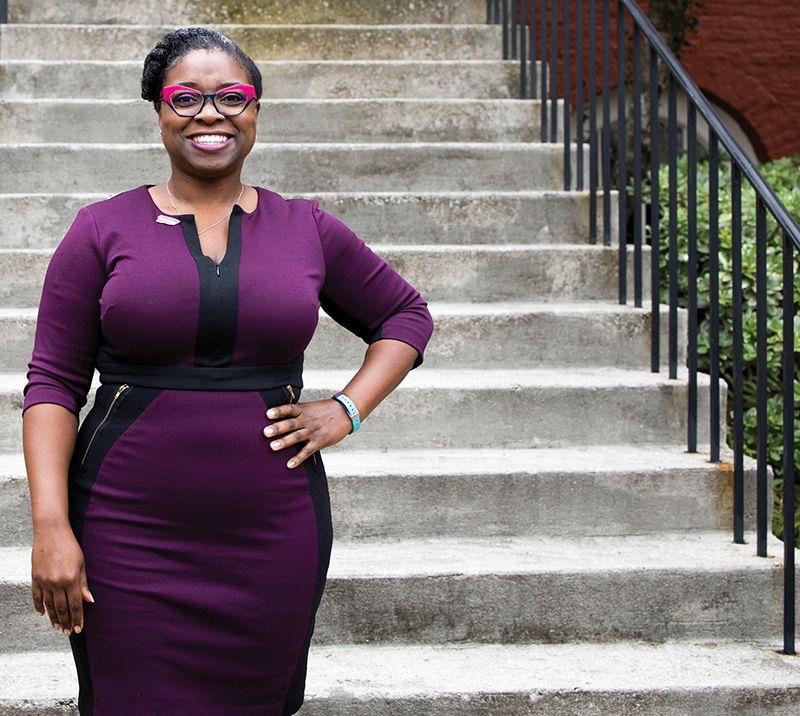Dr. Tamara Butler, who grew up on John's Island, returns home to lead the Avery

As an eighth grader, Dr. Tamara Butler won the 100 Black Men of America history competition, and the Avery Research Center for African American History and Culture congratulated her by presenting her with two books about the Black experience in early America. While the gift didn’t immediately spark a passion for African American studies in the John’s Island Geechee girl—that would come in graduate school—the exchange found a place in the archives of her memory, to be rediscovered two decades later. Last summer, Butler returned to the Lowcountry from the Midwest with two master’s degrees and a PhD to stand at the helm of the Avery. As executive director, she’s working to understand not only where the center has been but where it can go through partnerships, programming, and expansion. The dynamic leader also advises students at College of Charleston and Michigan State University, where she was an associate professor. She is co-authoring a book, to be published later this year, about community engagement with K-12 teachers. Perhaps, one day, Dr. Butler will present her text to an impressionable young academic and another spark will ignite. Here, she discusses her vision for the Avery.
CM: Why did you dedicate your career to African American studies?
TB: My family values knowing who we are, regardless of what others may tell us. My relatives aren’t degree-holding historians, but they understand that there’s power in documenting their own stories and there’s so much we haven’t learned. I went to Mount Zion Elementary, a short step from where The Progressive Club stands, but not once did my teachers intentionally talk about the center’s civil rights focus. Same with the Citizenship School. While I understood where I was from, it was my African American studies professors at Xavier and Ohio State who shifted my understanding of where I grew up. That catalyzed me.
CM: What’s your vision for the Avery Research Center?
TB: To so many community members, Avery is a cultural hub, an archive, and an event venue. But before Avery was a research center, it was a school. I want to come back to that. We do have an archive, museum, and reading room—and those are important. I want people to think differently about archives. We’re not a place with a bunch of untouched dusty boxes and a dehumidifier. We teach people to use and engage with the history in those boxes.
CM: How can Avery help bring our community together?
TB: The Avery has always been at the forefront of dismantling anti-Black racism and demonstrating that Black stories matter. A member of the libraries team noted that I talk about our archives as if they were a form of activism. That’s key. Lucille Whipper and so many founders believed this building should hold stories about Black Charleston, Black South Carolina, and beyond. One of the ways that we continue to disrupt racism, sexism, misogynoir [the specific discrimination experienced by Black women], homophobia, and other forms of xenophobia is to control how our stories are told.
CM: What are the center’s challenges?
TB: Space and funding, which go hand in hand. Right now, each of our staff wears at least three hats. We need to bring on more people, but we don’t have the office space. I want to renovate the building next door—123 Bull Street—into a meeting place, office space for student employees, and residence for a scholar or an artist-in-residence. That requires money. Also, I’ve learned that we have students, faculty, and staff who don’t even know Avery exists. I see a great opportunity to let people know we’re here.
CM: What are your plans for the future?
TB: My goal is for Avery to be a leader in Gullah-Geechee studies, an institution where people can be in conversation about the South Carolina sea islands and the Caribbean. We will also continue to train critical educators, not just in social studies and history but interdisciplinary fields. I’m really excited about the potential for an artist to make sense of our archives. College of Charleston has also introduced a master’s of arts concentration in public history. I want to work intentionally to recruit interested students, especially those of color.
Born: 1984 on John’s Island
Lives: With her plants in Berkeley County, “on the cusp of Summerville, Ladson, and Goose Creek”
Works: As executive director of the Avery Research Center for African American History and Culture and associate dean of Strategic Planning and Community Engagement at the College of Charleston Libraries